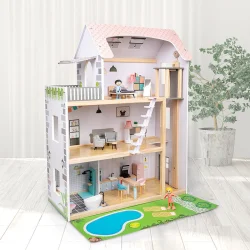How Role-Play Toys Inspire Real-Life Learning
2024-09-29
Children love to mimic the adults around them, and role-play toys give them the perfect outlet to do so. Whether they're pretending to be a doctor, teacher, or chef, these toys allow them to learn more about the world and the roles people play in it. Here’s how role-play toys inspire real-life learning and prepare kids for future experiences.
1. Learning Through Imitation
Kids are natural observers, often copying what they see adults doing. Role-play toys like toy kitchens, construction sets, or medical kits allow them to imitate real-world activities in a fun, risk-free way. By pretending to cook dinner, fix a car, or perform surgery, children become familiar with tasks and tools they will encounter later in life. This hands-on learning experience helps make complex ideas more understandable and less intimidating as they grow.
2. Understanding Responsibility and Independence
Playing with role-play toys can also teach children responsibility and independence. For example, a child using a toy cash register may learn the basics of math, such as counting money and giving change. A pretend cleaning set can help them understand the importance of keeping things tidy. These early lessons help build a foundation for responsible habits as they grow older.
3. Learning to Collaborate and Share
Role-play often happens in groups, requiring children to collaborate and share their toys. Whether it's taking turns being the doctor or agreeing on who gets to play the chef in a pretend restaurant, these interactions teach valuable lessons about teamwork, compromise, and cooperation. These social skills are essential for success in school and later life.
4. Inspiring Career Exploration
Role-play toys give children a window into the many different types of jobs and responsibilities that exist in the world. Playing with a toy fire truck or a police officer set can spark an interest in public service. A pretend science lab or space station might ignite a passion for science or engineering. Through play, children are exposed to a wide range of professions, helping them dream big about their future careers.
5. Improving Cognitive Development
Role-play toys offer a wide range of cognitive benefits. For example, building a pretend house with toy tools or assembling a robot with a science kit helps children learn how to follow instructions, plan, and sequence actions. These activities require concentration and focus, promoting cognitive development in areas like memory, logic, and problem-solving.
Conclusion
Role-play toys are not just a source of entertainment—they are a gateway to real-world learning. By allowing children to engage in pretend play, you’re fostering skills that will help them navigate real-life situations, understand responsibility, and explore future career options. Whether it's through imitating, collaborating, or exploring new ideas, role-play toys help children prepare for the world around them in a fun and educational way.



